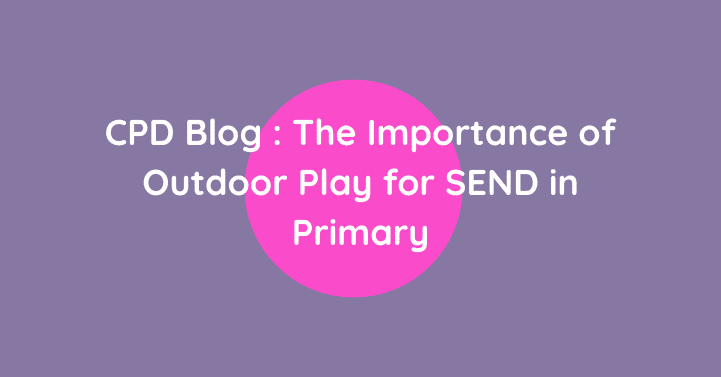The Importance of Outdoor Play for SEND in Primary
A Research-Informed Guide for Teachers & Practitioners
With Muddy Puddle Teacher® Toolkit Guidance
1. Why Outdoor Learning Is Essential for SEND in Primary
Many primary-aged children with SEND struggle with the demands and sensory load of the indoor classroom: sitting still, bright displays, noise, transitions, social expectations, and abstract learning.
Outdoor learning reduces these barriers and provides an active, calming and inclusive space for children to learn successfully.
Research Insights
1. Outdoor environments improve attention and self-regulation
Nature supports children’s ability to focus, particularly those with ADHD, sensory processing differences and anxiety.
Evidence: Faber Taylor & Kuo (2009); Söderström et al. (2013)
2. Physical movement boosts cognitive processing
Movement increases oxygen flow, improves memory formation and supports executive function — vital for SEND learners.
Evidence: Ratey (2008); Donnelly et al. (2016)
3. Nature reduces stress and emotional overload
Access to natural environments lowers cortisol and supports emotional regulation.
Evidence: Wells & Evans (2003); Kelz et al. (2013)
4. Outdoor learning improves social skills and collaboration
Open space reduces pressure, enabling children to work together more naturally.
Evidence: Sandseter & Sando (2016)
5. Hands-on outdoor experiences enhance academic outcomes
Learning becomes more concrete, memorable and meaningful.
Evidence: Rickinson et al. (2004)
2. Why Outdoor Learning Particularly Benefits SEND in Primary
SEND learners often require:
-
Movement and space
-
Sensory regulation
-
Reduced distractions
-
Lower social pressure
-
Concrete, hands-on experiences
-
Flexible seating and posture
-
High predictability and clear boundaries
Outdoor environments naturally provide these conditions.
Key SEND Benefits Outdoors
-
Decreased behavioural challenges
-
Greater engagement in learning
-
Improved emotional stability
-
Increased confidence and independence
-
Stronger peer relationships
-
More communication opportunities
-
Better resilience and risk awareness
Evidence: Änggård (2011); Barrable (2019)
3. What High-Quality Outdoor Learning Looks Like for Primary SEND
Outdoor learning for SEND pupils should be:
-
Structured yet flexible
-
Sensory-aware
-
Active and hands-on
-
Predictable in routines
-
Adapted for physical, sensory, or communication needs
-
Linked to curriculum outcomes
-
Inclusive for mixed abilities
Types of Outdoor Learning in Primary
Sensory Regulation Activities
Breathing stations, sensory walks, grounding tasks, nature textures.
Curriculum Learning Outdoors
Maths with sticks and stones, science investigations, storytelling trails, art in nature.
Social Play and Team Tasks
Group challenges, rope tasks, den-building, collaborative experiments.
Movement-Based Learning
Number hunting, active phonics, retrieval tasks outdoors.
Investigative Learning
Weather, forces, habitats, puddles, shadows, natural phenomena.
4. Indoor Barriers vs. Outdoor Advantages for SEND
Indoor Challenges
-
Noise
-
Visual overstimulation
-
Long sitting times
-
Social proximity
-
Rigid routines
-
Abstract learning
-
Sensory triggers
Outdoor Advantages
-
Lower sensory load
-
More space
-
Flexible seating and movement
-
Calm, predictable environments
-
Concrete, visual learning
-
Greater autonomy
-
Fewer behavioural pressures
For many SEND pupils, outdoor learning removes the obstacles holding them back.
5. The Muddy Puddle Teacher® Toolkit for SEND in Primary
This Toolkit uses simple, sustainable, adaptable methods that work brilliantly for SEND learners across KS1 and KS2.
Toolkit Methods
1. Bamboo Method
-
Supports structure, boundaries, shape work, measurement, angles
-
Great for ASD learners needing predictability
2. Rope Method
-
Clear boundaries for personal space
-
Perfect for team tasks, science investigations, sensory paths
3. Clay Method
-
Fine motor strength
-
Emotional regulation
-
Modelling and 3D curriculum tasks
4. Stick & Stone Method
-
Counting, phonics, sequencing, building
-
Ideal for tactile learners with sensory needs
5. Puddle Play Method
-
Science concepts, descriptive language, prediction skills
-
High-engagement, low-pressure investigations
6. Loose Parts & Upcycled Method
-
STEM challenges, construction, problem-solving
-
Encourages independence and teamwork
6. Practical Outdoor SEND Activities for Primary
English
-
Story trails
-
Outdoor word hunts
-
Clay characters
-
Natural mark-making
-
Role-play outdoors
Maths
-
Shape building with bamboo
-
Number lines made from rope
-
Sorting and comparing natural objects
-
Measuring outdoors
Science
-
Forces with ropes and slopes
-
States of matter with puddles
-
Habitats and nature exploration
-
Shadow and light experiments
Wellbeing & Behaviour Support
-
Regulation walks
-
Quiet sensory corners
-
Grounding activities
-
Breathing tasks in nature
Social & Emotional Development
-
Co-operative building
-
Outdoor team tasks
-
Sharing natural materials
-
Leadership roles outdoors
7. Why Natural & Upcycled Resources Work for Primary SEND
Supported by Nicholson’s Loose Parts Theory (1971), open-ended natural materials:
-
Provide sensory variation
-
Support self-regulation
-
Reduce cognitive load
-
Allow multiple entry points to the same task
-
Encourage problem solving
-
Promote independence
-
Are cost-effective and sustainable
This aligns with The Muddy Puddle Teacher® Programme’s focus on simplicity, sustainability and inclusion.
8. Reflection Questions for Primary Staff
-
Which SEND pupils thrive when learning outdoors?
-
How does behaviour change outside compared to indoors?
-
Which Toolkit method can we implement this week?
-
How can we adapt outdoor practice for physical or sensory needs?
-
How can outdoor experiences support EHCP outcomes?
-
What barriers are stopping us teaching outdoors more?
9. Next Steps for Primary Teams
Strengthen your inclusive outdoor practices with:
-
The Muddy Puddle Teacher® Level 1–4 Programme
-
SEND specialism courses (ASD, Dyslexia/Dyscalculia, Physical Disabilities, Communication Needs)
-
Science, Maths and English outdoor curriculum modules
-
Free demonstrations on our social media pages
For whole-school or tailored SEND training:
info@themuddypuddleteacher.co.uk


